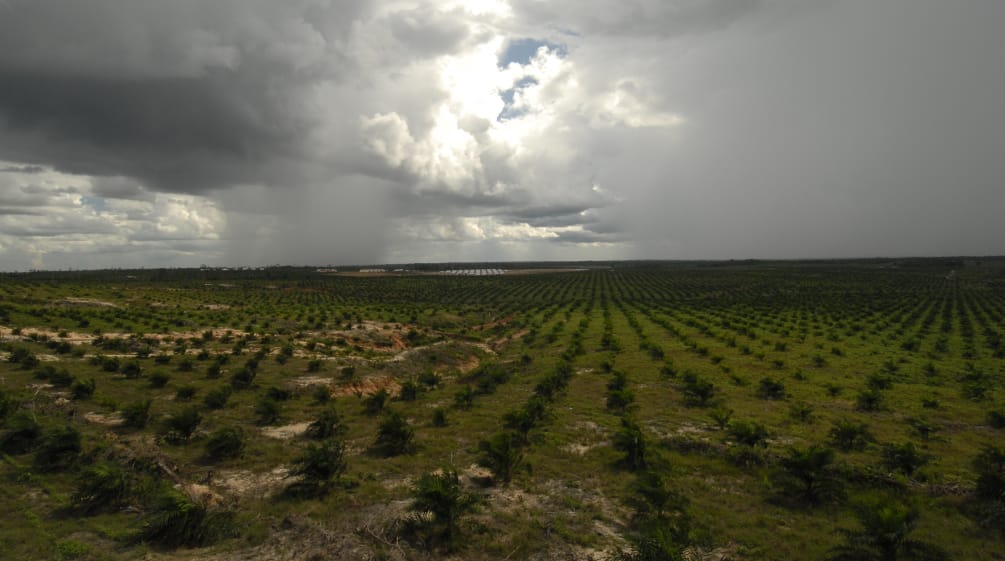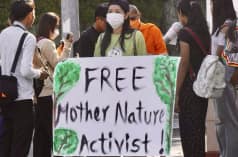Palm Oil Industry will never be sustainable
 © COP
© COP
Nov 22, 2008
Palm oil plantations already have caused deforestation of primary forests that in reality are part of ancestral and community land. As consequences, water sources, food, medicine, spiritality and culture are depleted. On November 18-20, 2008, palm oil companies met again (at the Round Table on Sustainable Palm Oil) in Bali, Indonesia, to continue their large scale expansion plannings.
*Jakarta, 21 November 2008*
On November 18-20, 2008, palm oil companies met again (at the Round Table on Sustainable Palm Oil) in Bali, Indonesia, to continue their large scale expansion plannings. During that RSPO meeting, WALHI demanded
* the total paralysation of further deforestation and conversion of land use to oil palm cultivation,
* the cancellation of trade relations between companies purchasing palm oil and suppliers destroying the livelihood of indigenous peoples and violate human rights,
* to stop violence and exploitation of livelihood ressources of the people, and the
* resolution of all existing land conflicts between citizens and plantations companies
The UN Intergovernmental Panel on Forests has identified government policies replacing forests by industrial tree plantations, including palm oil plantations, as the causes of deforestation and degradation. Palm oil is produced in large scale monocultures in tropical countries to be exported to the global market (including the EU, China, India and the United Nations of America).
The negative consequences of monoculture oil palm plantations are tangible in Indonesia, Malaysia, Papua-New Guinea, Cameroon, Uganda, Côte d’Ivoire, Cambodia, Philippines and Thailand and also in Colombia, Ecuador, Peru, Brazil, Guatemala, Mexico, Nicaragua and Costa Rica. Palm oil plantations already have caused deforestation of primary forests that in reality are part of ancestral and community land.
As consequences, water sources, food, medicine, spiritality and culture are depleted. Furthermore, deforestation in the world is the second largest source contributing to increasing atmospheric carbon dioxide levels.
According to the UN Permanent Forum on Indigenous Issues, 60 million indigenous people all over the world run the risk of loosing their land and means of subsistence due to the expansion of plantations to produce agro-energy. Of these, 5 million people are located in Borneo (Indonesia) where the indigenous communities are threatened by plans for the expansion of oil palm plantations.
In spite of this, Government agricultural and forest planning has foreseen establishing another millions of hectares of new oil palm plantations.
"WALHI rejects the RSPO because the principles and criteria of the RSPO „sustain“ the expansion of huge scale palm oil plantations, but not community gardening“, says Berry Nahdian Forqan, Director of WALHI. „RSPO is designed to legitimate the continuous expansion of the palm oil industry, but any model that includes the conversion of natural habitats into large-scale monoculture plantations will never be sustainable.“
The Roundtable on Sustainable Palm Oil (RSPO) is dominated by the industry and does not genuinely consult affected communities who have to accept the worst negative consequences. The RSPO scheme enables the companies to certify individual plantations, eluding overall assessment of their whole production of all of their plantations.
Again, RSPO is yet another attempt at camouflaging and denying the true situation, providing “a green-wash” to make a model of production that is intrinsically destructive and socially and environmentally unsustainable, appear to be “responsible.”
With accelerating climate crisis, large scale industrial monoculture plantations have negative consequences: They further threaten the existence of indigenous people, bring more occupation of land, more land conflicts and human rights violations, including violations to the right to food souvereignty, and the use of toxic chemicals on a large scale. And the winners are the companies, not the people.
Contact Persons
In Indonesia: Mukri Friatna (Manager Region Sumatra, WALHI) +62 813 69721800
In UK: Ms Almuth Ernsting (BIOFUELWATCH) +44 122 4324797
In Germany: Marianne Klute (Watch Indonesia!) +49 176 24526549










